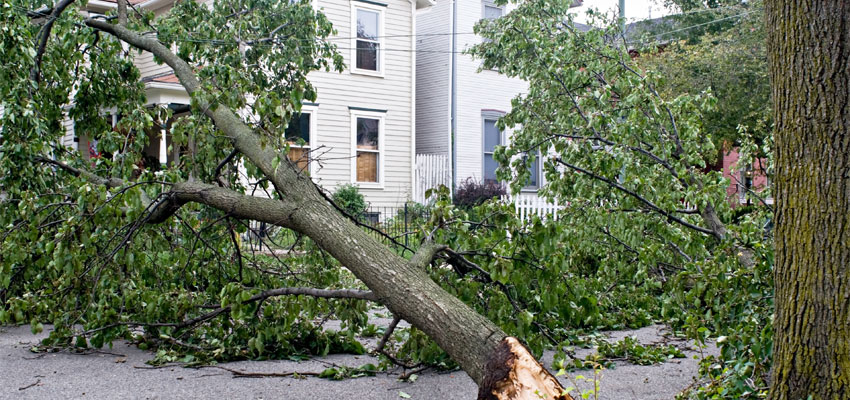6 Action Steps You and Your Family Can Take to Prepare for a Tornado

When it comes to protecting yourself and your family against New England’s most hazardous weather events, making tornado preparations may not be at the top of your priority list. But the Bearingstar team wants to make sure that our clients and neighbors in Massachusetts and Connecticut are aware that this region is definitely not immune to these powerful, quick-moving storms.
According to meteorologists, the warmer atmosphere and increasing humidity, especially during the summer months, are leading to a greater number of severe thunderstorms, which ultimately raises the risk for a tornado. And, in fact, tornado activity has worsened in the area over the past six years. In that time, we’ve experienced a higher-than-average number of tornado days, more days with multiple tornadoes touching down, and the strongest twister, with up to 135 mph wind gusts, to hit New England in nearly 10 years.
Typically, tornadoes in our area are not nearly as intense as the supercell version common in Tornado Alley. But our “weaker” storms still pack quite a punch and can cause injuries and substantial property damage. So, even though there may be clear skies right now, it’s really smart to take time today to get ready for the possibility of one of these violent storms touching down in the future. The Bearingstar team wants to help by providing you with five action steps, culled from weather and public health and safety agencies, that you and your family can take to prepare for a tornado.
6 Things You and Your Family Can Do to Prepare for a Tornado
1. Learn the Warning Signs of a Pending Tornado
There are several visual and audio clues and cues associated with a tornado, including a change in the color of the sky to very black or an eerie green, a loud roar like the sound of a freight train, and swirling debris close to the ground.
2. Identify the Best Place to Seek Shelter
Have discussions with your family about where they will go if they are at school, work, or home and they need to seek shelter from a tornado. The Centers for Disease Control and Prevention says the safest place to be during a tornado is in a basement; a storm cellar; or a windowless, interior room on the lowest floor, like a bathroom, closet, or hallway.
3. Enable Emergency Weather Alerts on Mobile Devices
The National Weather Service and other authorized government alerting authorities have the ability to send out a wireless emergency alert through your mobile carrier during a tornado or other similar emergency situation. While you don’t have to sign up for these alerts, you do need to make sure your mobile device is enabled to receive them.
4. Create a Family Emergency Plan and Regularly Practice It
A key component of this disaster preparedness plan is putting together a home emergency kit, which typically includes everything from gallon jugs of water and numerous nonperishable food items to a change of clothes for every member of the household, important documents, and cash. Once you put this kit together, it’s recommended that you review it annually as some things may need to be replaced.
5. Know How to Respond to a Tornado Watch Versus a Tornado Warning
According to the National Weather Service, if there is a tornado watch in your area, it means that conditions are ripe for severe storms and twisters. You and your family should go over your emergency plan, take inventory of your emergency kit supplies, and double-check you have everything you need in the room you intend to shelter in. If, however, a tornado warning has been issued, it means that a tornado is occurring or expected soon in your area. In that case, all you and your family should focus on is getting to a secure location immediately.
6. Find Out if Your Personal Insurance Policies Include Coverage for Tornado Damage
While the safety of your loved ones is your top priority when preparing for a tornado, you may also be concerned about protecting your home, vehicles, and belongings from these dangerous storms. That’s why now is an excellent time to meet with a local Bearingstar insurance professional, who can review your homeowners, renters, condo, and car insurance policies and explain the financial protection against tornado damage they offer. They can also make sure your coverage amounts seem appropriate for your specific property and its level of risk and help you fill in any coverage gaps with broadening endorsements if necessary.
After a Storm, You Can Rely on the Bearingstar Team for Calm and Steady Support
In the aftermath of a tornado, or any natural disaster, there can be a great deal of confusion and disorder. That’s why we want you to know now that the Bearingstar team is ready to respond to all your insurance questions if you experience an emergency that damages your property, ruins your belongings, and displaces your family. Please reach out to us and we will be there to help in any way we can, including guiding you through the claims process and facilitating a faster and fair resolution.
Not a client of Bearingstar? If it would give you better peace of mind to have our local, experienced, and knowledgeable team in your corner, please contact our Massachusetts professionals at 877-801-7424 or our Connecticut professionals at 888-519-9996. We are dedicated to protecting your home, family, and what is most important to you.
Back to Blog